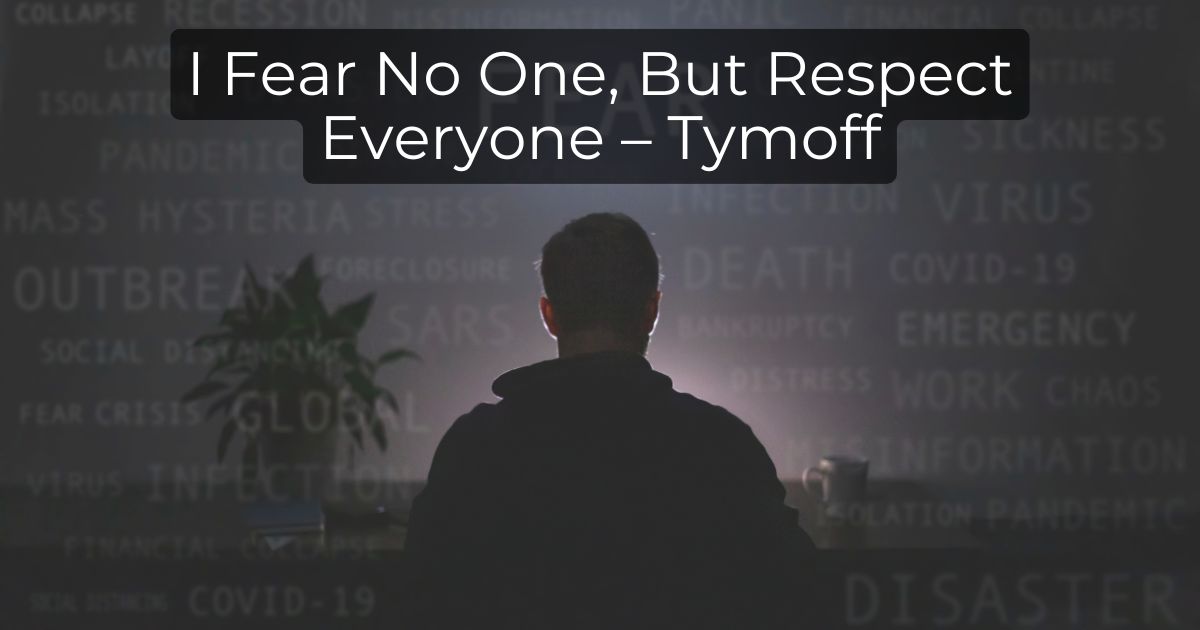The phrase “I fear no one, but respect everyone – Tymoff” is a powerful mantra that combines self-confidence with humility. Attributed to Tymoff, this philosophy promotes fearlessness without arrogance and respect without submission. In today’s world, such an approach holds great significance, shaping how we interact with others both personally and professionally.
This article delves into the meaning and implications of this phrase, explores its origins, and provides practical insights on how to incorporate it into everyday life. Let’s explore why “I fear no one, but respect everyone – Tymoff” is a balanced and transformative mindset.
Origins and Historical Context of the Phrase
The idea behind “I fear no one, but respect everyone – Tymoff” has roots in various ancient philosophies and cultural practices. From Stoicism to Buddhism, many teachings emphasize overcoming fear and treating others with kindness. In Roman philosophy, for instance, Stoics believed in mastering fear to maintain inner peace. Simultaneously, respect was considered a fundamental virtue in maintaining harmonious relationships.
Over time, these ancient ideals have evolved and been integrated into modern leadership principles and personal development strategies. Tymoff’s modern usage of the phrase encapsulates these age-old values while making them relevant to contemporary society.
Who is Tymoff?
Though not widely known, Tymoff represents an individual or possibly a platform that promotes meaningful life philosophies. The phrase “I fear no one, but respect everyone – Tymoff” has gained traction through various channels, including social media and motivational content, where it is associated with Tymoff’s teachings.
The focus of Tymoff’s message is personal empowerment balanced with humility. By encouraging people to face their fears while maintaining respect for others, Tymoff’s philosophy resonates with a diverse audience seeking both confidence and connection.
Breaking Down “I Fear No One”
The first part of the phrase, “I fear no one,” encourages a mindset of fearlessness. This doesn’t mean recklessness or an absence of caution; rather, it refers to an inner strength that allows individuals to confront challenges without being paralyzed by fear. Fear can often hold us back, preventing growth and stifling potential.
When we declare that we “fear no one,” we embrace the belief that no person or situation should control our emotions or limit our actions. This kind of fearlessness is rooted in self-confidence and the knowledge that external factors do not define our worth.
The Power of Respect in “But Respect Everyone”
Respect is one of the most important values in human interaction. The second part of the phrase, “but respect everyone,” highlights the importance of humility and recognizing the inherent dignity in every individual.
Respect transcends social hierarchies, gender, race, or status. By respecting everyone, we acknowledge that every person, regardless of their background, deserves basic human decency. In today’s polarized society, this message is more important than ever. Even in the face of disagreement or conflict, showing respect allows for constructive conversations and meaningful relationships.
“I Fear No One, But Respect Everyone – Tymoff” in Leadership
In leadership, the combination of fearlessness and respect is particularly powerful. A good leader is someone who doesn’t shy away from difficult decisions, nor do they allow fear of criticism to deter them from doing what’s right. However, they also lead with respect, ensuring their team members feel valued and heard.
Leaders like Nelson Mandela and Mahatma Gandhi are prime examples of individuals who embodied this mindset. Both were fearless in their pursuit of justice but were always respectful of others, regardless of their adversarial stance.
The Role of Confidence in “I Fear No One”
Confidence is the cornerstone of the statement “I fear no one.” It’s not about being superior to others but about believing in your own abilities and values. Confident individuals are not easily swayed by intimidation or fear tactics. They trust their instincts and make decisions that reflect their true selves.
Cultivating confidence takes practice. It requires a clear understanding of one’s strengths and weaknesses and the courage to act in spite of doubts. With confidence, we can navigate life’s challenges without allowing fear to cripple us.
Humility as a Core Value in “Respect Everyone”
While fearlessness is a key aspect of the phrase, the real strength lies in balancing that confidence with humility. Humility is often misunderstood as a sign of weakness, but in reality, it’s the quiet confidence that allows us to recognize the worth of others without feeling threatened.
Humility allows us to approach every interaction with an open mind, knowing that we can learn from anyone. When we respect others, we build stronger connections, resolve conflicts more easily, and foster environments of trust and collaboration.
“I Fear No One, But Respect Everyone – Tymoff” in the Workplace
In the workplace, the ability to “fear no one, but respect everyone – Tymoff” can create a healthy and productive atmosphere. Employees who are not afraid to express their ideas or challenge the status quo bring innovation and creativity to the table. However, it is just as important to cultivate an environment where respect is the norm.
Respect leads to stronger teams, where individuals feel safe to voice their opinions without fear of retaliation. This combination of fearlessness and mutual respect can lead to increased productivity and a more inclusive work culture.
Also Read: Why Amity Network Is Already Disabled
Applying “I Fear No One, But Respect Everyone – Tymoff” in Personal Relationships
In personal relationships, fearlessness helps you set boundaries and express yourself honestly, while respect ensures that your communication is kind and constructive. Too often, fear of conflict or rejection can lead to passive behavior, where individuals do not assert their needs. On the other hand, a lack of respect can cause domineering or dismissive behavior.
By embracing both principles, we create healthier relationships, built on mutual understanding and respect. This leads to deeper connections and more fulfilling partnerships.
The Psychological Benefits of Fearlessness
Living without fear has tremendous psychological benefits. People who embrace fearlessness are generally more resilient, adaptable, and emotionally balanced. Fear, especially when excessive, leads to anxiety, stress, and avoidance behaviors.
Overcoming fear helps individuals confront challenges head-on and build emotional strength. Techniques such as mindfulness, cognitive behavioral therapy, and positive affirmations can all contribute to cultivating fearlessness in everyday life.
The Social Impact of Respecting Everyone
Showing respect to everyone not only benefits interpersonal relationships but also has a broader social impact. Communities and societies thrive when respect is a shared value. It reduces conflict, promotes understanding, and creates environments where people feel safe and valued.
By respecting others, we contribute to a culture of empathy and kindness, qualities that are desperately needed in today’s divisive world.
“I Fear No One, But Respect Everyone – Tymoff” in Conflict Resolution
Fear and disrespect often exacerbate conflicts, while fearlessness and respect can help de-escalate them. In situations of disagreement, facing the issue fearlessly allows for open and honest discussion. At the same time, maintaining respect for the other person prevents the conversation from becoming hostile or accusatory.
By using this approach in conflict resolution, both parties are more likely to reach a mutually beneficial outcome. Respect helps foster understanding, and fearlessness ensures that important issues are addressed without avoidance.
Why “I Fear No One, But Respect Everyone – Tymoff” Is a Balanced Approach
The philosophy behind “I fear no one, but respect everyone – Tymoff” is a balanced one because it encourages both inner strength and outward compassion. Too much fearlessness without respect can come across as arrogance or indifference. On the other hand, too much emphasis on respect without fearlessness can lead to passivity or people-pleasing behaviors.
By balancing these two principles, we achieve a state where we can stand up for ourselves while still valuing the perspectives and rights of others.
The Influence of “I Fear No One, But Respect Everyone – Tymoff” on Modern Society
In a world where polarization and division seem to be increasing, the philosophy of “I fear no one, but respect everyone – Tymoff” offers a pathway to healing. It encourages individuals to stand firm in their beliefs and values while still respecting the humanity and worth of others.
Social movements that promote equality, justice, and human rights often embody this principle. Activists fearlessly advocate for change while respecting the dignity and voices of all involved.
“I Fear No One, But Respect Everyone – Tymoff” in Self-Improvement
This philosophy can serve as a powerful tool for self-improvement. It teaches us to overcome our fears, which often stand in the way of personal growth, and to respect others as we navigate our personal journeys.
By incorporating this mindset, we not only become stronger individuals but also more compassionate and understanding towards others. This leads to more fulfilling relationships and personal satisfaction.
Philosophical Perspectives on “I Fear No One, But Respect Everyone – Tymoff”
From Stoicism to Eastern philosophies, the principles behind “I fear no one, but respect everyone – Tymoff” have been echoed by thinkers throughout history. Stoics like Marcus Aurelius believed in the importance of mastering fear in order to live a virtuous life, while Confucianism placed a high value on respect for others as a core social value.
These philosophical traditions show that the balance between fearlessness and respect is a timeless human pursuit.
Criticism and Misinterpretation of “I Fear No One, But Respect Everyone – Tymoff”
While the philosophy is generally positive, it can be misinterpreted. Some may take “fear no one” as a license for arrogance or aggression, while others might see “respect everyone” as a call for submission or people-pleasing.
However, this philosophy, when understood properly, is about balancing strength with humility. It encourages individuals to advocate for themselves while still honoring the perspectives and rights of others.
Practical Steps to Embrace “I Fear No One, But Respect Everyone – Tymoff”
Incorporating the principles of “I fear no one, but respect everyone – Tymoff” into your daily life requires practice:
- Build Self-Confidence: Develop a positive self-image through affirmations and by challenging yourself to face fears in small, manageable ways.
- Practice Empathy: Take the time to understand others’ perspectives, even when disagreements arise. This opens the door to respectful dialogue.
- Set Healthy Boundaries: Establish clear boundaries in relationships to ensure mutual respect. This protects your emotional well-being and fosters healthy interactions.
- Challenge Your Fears: Confront fears in a controlled manner, allowing yourself to grow through the experience. Mindfulness and self-reflection can aid in this process.
These practices can help individuals embody this philosophy in both personal and professional settings.
Conclusion
The phrase “I fear no one, but respect everyone – Tymoff” serves as a guide for those seeking a balanced approach to life. It teaches us to be strong in the face of challenges while remaining humble and kind to others. In a world often dominated by fear and division, this mindset offers a path to both personal empowerment and collective harmony.










